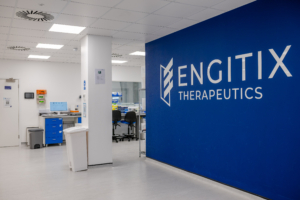
NuCana raises US$114m in IPO of ADSs
Scotch cancer corp NuCana plc was up 3% (to US$18.61) after closing an initial public offering on Friday led by Citigroup, Jefferies and Cowen and co-managed by William Blair.
On Friday, NuCana plc (NCNA) raised 7,596,505 American Depositary Shares (ADSs) at US$15 per ADS at Nasdaq, which includes 929,505 shares sold upon partial exercise of the underwriters’ option to purchase additional ADSs, for total gross proceeds of approximately US$114m. Each ADS represents one ordinary share of NuCana. The offering was made only by means of a prospectus.
NuCana uses its ProTide platform technology to phosporylate nucleoside analogs so that these derivatives of the most widely prescribed chemotherapy agents are taken up much easier than their originators and accumulate in the cell. By adding and protecting this phosphate group, the company has designed its next-generation chemotherapeutics to overcome key cancer resistance mechanisms in the uptake, activation and breakdown of nucleoside analogs. Furthermore, ProTides resist breakdown, and are more stable than non-modified original chemotherapeutics. Thus, NuCana expects them to reduce the generation of toxic byproducts that can result from the breakdown of nucleoside analogs.
NuCana’s most advanced ProTide candidates, Acelarin and NUC-3373, are new chemical entities derived from the nucleoside analogs gemcitabine and 5-fluorouracil, respectively. Acelarin is currently being evaluated in Phase I-III clinical studies across several solid tumor indications, including ovarian cancer, biliary cancer and pancreatic cancer. NUC-3373 is currently in a Phase I study for the treatment of a wide range of advanced solid tumor cancers.
To date, Acelarin has been evaluated in 130 patients with cancer. In a Phase I dose-ranging study enroling 49 evaluable patients with advanced metastatic solid tumours, Acelarin was well tolerated, achieved a 78% disease control rate and was associated with intracellular levels of active anti-cancer metabolite over 200 times higher than those reported for gemcitabine. A subset of 14 evaluable patients with relapsed/refractory gynecological cancers achieved a 93% disease control rate. In a Phase Ib dose-ranging study in 23 evaluable patients with recurrent ovarian cancer, Acelarin was combined with carboplatin and achieved a 96% disease control rate. Based on these disease control rates and its tolerability profile, the company has begun a Phase II study in patients with platinum-resistant ovarian cancer for which NuCana expects to report first data in 2018.


 Picture from Ferdinand Stöhr on Unsplash
Picture from Ferdinand Stöhr on Unsplash  Photo from Giulia Bertelli on Unsplash
Photo from Giulia Bertelli on Unsplash  Engitix
Engitix